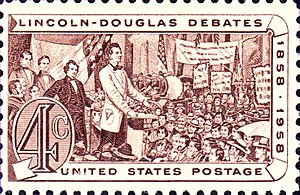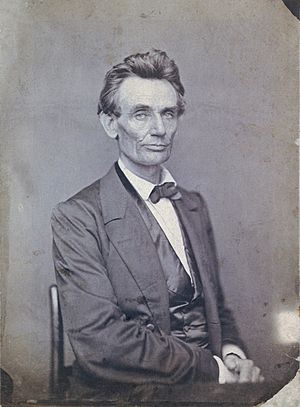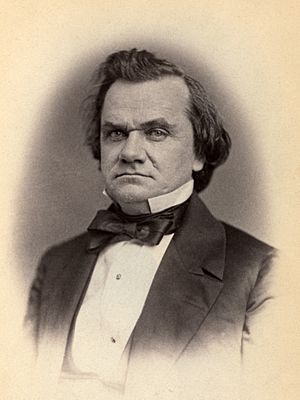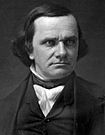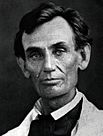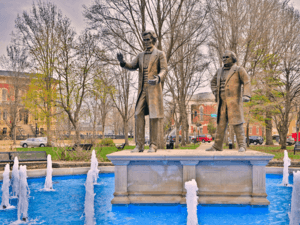Lincoln–Douglas debates facts for kids
The Lincoln–Douglas debates were a series of seven important discussions. They took place between Abraham Lincoln and Stephen A. Douglas. Lincoln was running for the United States Senate from Illinois as a Republican. Douglas was the current Senator and a Democrat.
Back then, state legislatures chose senators, not the people. So, Lincoln and Douglas were trying to win votes for their parties in the Illinois General Assembly. The debates were a way to get a lot of attention. They were like the first big "media events."
For Lincoln, these debates were a chance to become more famous across the country. They also helped the new Republican Party grow. Douglas wanted to defend his work, especially his idea of "popular sovereignty." This idea meant people in new territories should decide on slavery themselves. It was part of the Kansas–Nebraska Act of 1854.
The candidates spoke in seven of Illinois's nine districts. They had already spoken in Springfield and Chicago. Each debate lasted about three hours. One person spoke for 60 minutes, then the other replied for 90 minutes. The first speaker then had a final 30 minutes. They took turns speaking first. Douglas, as the current senator, spoke first in four debates. They were held outside, usually from 2 to 5 p.m., with many people listening.
The main topic was slavery. They discussed if slavery should be allowed in new states. These new states would be formed from land gained in the Louisiana Purchase and Mexican Cession. Douglas believed the people in these new states should decide (popular sovereignty). Lincoln argued against slavery spreading. But he also said he was not trying to end slavery where it already existed.
Newspapers covered these debates very closely. Both candidates felt they were speaking to the whole nation. New technology helped a lot. This included railroads, the telegraph, and Pitman shorthand. Large newspapers from Chicago sent reporters to write down every word. Thanks to new railroads, it was easy to get to the debates from Chicago.
During each debate, runners took the notes to the next train to Chicago. On the train, other reporters turned the shorthand into full text. This text was then ready for printing and for the telegraph. It was sent across the country very quickly. Newspapers published the speeches in full, sometimes just hours after they were given. Some papers added small changes or headlines to help their favorite candidate. The Associated Press sent messages everywhere. This made the debates national events. They were even printed as small books.
The debates happened between August and October 1858. Many people attended. For example, 12,000 people came to Ottawa, and 15,000 to Freeport. The debates near Illinois's borders drew people from other states too. Many people traveled within Illinois to follow the debates.
Douglas won the election and was re-elected by the Illinois General Assembly. But the debates made Lincoln famous across the country. This helped him prepare for his presidential campaign in 1860. Lincoln later edited the debate texts and published them in a book. This book sold well and helped him get the Republican Party's nomination for president.
Contents
Why These Debates Were Important
The Candidates' Backgrounds
Douglas had been a U.S. Senator since 1846. He wanted to be re-elected for a third time in 1858. Slavery was a big issue during his time in the Senate. He supported "popular sovereignty" for new territories. This meant people in those areas would vote on whether to allow slavery. Before this, the federal government usually made these decisions. Douglas helped pass the Kansas–Nebraska Act in 1854.
Lincoln was also elected to Congress in 1846. He served one two-year term. He disagreed with Douglas on slavery. Lincoln supported the Wilmot Proviso, which tried to ban slavery in any new territory. He returned to politics in the 1850s to fight the Kansas–Nebraska Act. He also helped create the new Republican Party.
Before the debates, Lincoln said Douglas was trying to scare people about different races mixing. He said this made many people leave the Republican Party. Douglas replied that Lincoln was an abolitionist. He said Lincoln believed the Declaration of Independence applied to Black people as well as White people.
Lincoln argued that Douglas was part of a plan to make slavery legal everywhere. Lincoln said ending the Missouri Compromise ban on slavery in Kansas and Nebraska was the first step. He also said the Dred Scott decision was another step. He feared that a similar Supreme Court decision could make Illinois a slave state.
Douglas was known as a very skilled debater. He was quick-thinking and good at arguing. He could make his points clear or confuse his opponent. He spoke very well and used strong, clear English. He was not known for jokes or fancy words. But he was a natural speaker and a strong debater. He could easily convince a crowd.
The Debates: Key Locations and Topics
When Lincoln published the debates as a book, he included some earlier speeches. These included his "Lincoln's House Divided Speech" from June 16. He also included speeches by Douglas and their letters.
The seven main debates took place in these Illinois towns:
- Ottawa on August 21
- Freeport on August 27
- Jonesboro on September 15
- Charleston on September 18
- Galesburg on October 7
- Quincy on October 13
- Alton on October 15
Slavery was the main topic. They especially discussed if slavery should spread into the territories. Douglas's Kansas–Nebraska Act had removed the Missouri Compromise's ban on slavery. It allowed people in Kansas and Nebraska to vote on slavery. Both Lincoln and Douglas used quotes from the Founding Fathers to support their arguments.
Ottawa Debate
At Ottawa, Lincoln said he hated slavery because it was very unfair. He also hated it because it made America look bad to other countries. He said it made friends of freedom doubt America's honesty. He felt it forced good people to fight against the basic ideas of freedom.
Lincoln argued that popular sovereignty would make slavery legal across the whole country. Douglas replied that both major parties believed in popular sovereignty. He said the Compromise of 1850 was an example of this. Lincoln said the national policy was to limit slavery. He pointed to the Northwest Ordinance of 1787 as an example. This law banned slavery from a large part of the Midwest.
The Compromise of 1850 allowed Utah and New Mexico to decide on slavery. But it also made California a free state. It reduced the size of the slave state of Texas. It also ended the slave trade in District of Columbia. In return, the South got a stronger Fugitive Slave Law. Douglas said the Compromise of 1850 replaced the Missouri Compromise's ban on slavery. Lincoln disagreed. He said Douglas was wrong to think popular sovereignty and the Dred Scott decision fit with the Compromise of 1850. Lincoln believed popular sovereignty would actually spread slavery everywhere.
Douglas accused Lincoln and his party of being abolitionists. He used Lincoln's "House Divided Speech" as proof. In that speech, Lincoln said, "I believe this government cannot endure permanently half slave and half free." Douglas also said Lincoln opposed the Dred Scott decision. This decision said Black people did not have the rights of citizens. Lincoln replied that the "next Dred Scott decision" could allow slavery to spread into free states.
Douglas also accused Lincoln of wanting to change state laws that kept Black people out of states like Illinois. Lincoln did not argue for full social equality. But he said Douglas ignored the basic humanity of Black people. He stated that enslaved people had an equal right to earn their own living. He said, "in the right to eat the bread, without the leave of anybody else, which his own hand earns, he is my equal and the equal of Judge Douglas, and the equal of every living man."
Lincoln said he didn't know how slavery should end. He thought about sending freed slaves to Africa, but knew it was not practical. He said it would be wrong to treat freed slaves as "underlings." But he admitted there was strong opposition to social and political equality. He said that Douglas's public indifference would lead to slavery spreading. This was because it would make people accept slavery. Lincoln believed that "public sentiment is everything." He said Douglas "cares not whether slavery is voted down or voted up." He felt Douglas would "blow out the moral lights around us" and destroy the love of freedom.
Freeport Debate
At Freeport, Lincoln asked Douglas a difficult question. He wanted Douglas to explain how popular sovereignty could work with the Supreme Court's Dred Scott decision. The Court had said the federal government could not ban slavery in territories. Douglas replied that people in a territory could still keep slavery out. They could simply refuse to pass laws needed to protect slavery.
This answer became known as the Freeport Doctrine. It upset Southerners and hurt Douglas's chances of becoming president in 1860. Southern politicians used this idea to divide the Democratic Party. This split the main political party in 1858. Douglas failed to get support from all parts of the country. He lost Republican support because they saw him as unprincipled. He lost Southern support by rejecting a pro-slavery constitution and supporting the Freeport Doctrine.
Jonesboro Debate
In Jonesboro, Lincoln said that slavery spreading would endanger the country. He mentioned past arguments over slavery in Missouri and in land from Mexico. He also spoke about the violence in Kansas. He believed the crisis would end when slavery was put "in the course of ultimate extinction."
Charleston Debate
Before the debate in Charleston, some Democrats held a banner. It read "Negro equality" and showed a white man, a Black woman, and a child.
Lincoln started his speech by saying his concerns about slavery did not mean he supported racial equality. He stated: "I will say then that I am not, nor ever have been in favor of bringing about in any way the social and political equality of the white and black races—that I am not nor ever have been in favor of making voters or jurors of negroes, nor of qualifying them to hold office, nor to intermarry with white people; and I will say in addition to this that there is a physical difference between the white and black races which I believe will for ever forbid the two races living together on terms of social and political equality. And inasmuch as they cannot so live, while they do remain together there must be the position of superior and inferior, and I as much as any other man am in favor of having the superior position assigned to the white race."
Douglas then said Lincoln had an ally in Frederick Douglass, who preached "abolition doctrines." He claimed Frederick Douglass told supporters of "negro equality" to support Lincoln. Douglas also said Lincoln was not consistent about racial equality. He pointed out Lincoln's earlier statements that "all men are created equal" applied to Black people too. Lincoln replied, "I tell him very frankly that I am not in favor of negro citizenship."
Galesburg Debate
At Galesburg, Douglas again tried to show Lincoln was an abolitionist. He used quotes from Lincoln's Chicago speech. Douglas focused on Lincoln's belief that "all men are equal."
Alton Debate
At Alton, Lincoln tried to explain his statements on equality. He said the authors of the Declaration of Independence "intended to include all men." But they did not mean "all men equal in all respects." Lincoln said they meant to create a standard for a free society. This standard should always be worked for, even if never perfectly reached. He said it would spread freedom and happiness to all people, everywhere.
He compared his views to those of John C. Calhoun and Senator John Pettit. They had called the Declaration "a self-evident lie." Lincoln said Chief Justice Roger Taney and Stephen Douglas were going against Thomas Jefferson's truth. He felt they were making Black people seem less human. This prepared the public to think of them only as property. Lincoln believed slavery was wrong and should not be allowed to grow.
At Alton, Lincoln said: "It is the eternal struggle between these two principles—right and wrong—throughout the world. ... It is the same spirit that says, 'You work and toil and earn bread, and I'll eat it.' No matter in what shape it comes, whether from the mouth of a king who seeks to bestride the people of his own nation and live by the fruit of their labor or from one race of men as an apology for enslaving another race, it is the same tyrannical principle." These words were later used in music by Aaron Copland.
Lincoln used many colorful phrases. He compared one of Douglas's arguments to turning a horse chestnut into a chestnut horse. He also said Douglas's evasion was like a cuttlefish hiding in ink. In Quincy, Lincoln called Douglas's Freeport Doctrine "as thin as the homeopathic soup that was made by boiling the shadow of a pigeon that had starved to death."
How Technology Helped
New technology was very important to the debates' success. New railroads connected cities quickly. A message that took a week by horse could arrive in hours. Pitman shorthand allowed reporters to write down speeches almost as fast as they were spoken. This was much better than before. Finally, the electrical telegraph could send messages anywhere east of the Rocky Mountains.
Allen C. Guelzo, who wrote a book about the debates, said: "The combination of shorthand, the telegraph and the railroad changed everything." He added, "It was unprecedented. Lincoln and Douglas knew they were speaking to the whole nation. It was like JFK in 1960 coming to grips with the presence of the vast new television audience."
What Happened Next
|
||||||||||||||||||||
|
||||||||||||||||||||
A surprise event before the election was when former Whig John J. Crittenden supported Douglas. These non-Republican former Whigs were important swing voters. Crittenden's support for Douglas hurt Lincoln's chances of winning.
The voting districts were set up to favor Douglas's party. Democrats won 40 seats in the state House of Representatives. Republicans won 35. In the State Senate, Republicans had 11 seats, and Democrats had 14. Douglas was re-elected by the legislature, 54–46. This happened even though Republican candidates got more votes overall.
However, the wide media coverage of the debates made Lincoln a national figure. This prepared him to be a strong candidate for president in 1860. An Ohio publisher, Follett and Foster, published the debate texts. The book was called Political Debates Between Hon. Abraham Lincoln and Hon. Stephen A. Douglas. It sold many copies, with one printing selling 16,000 books.
Remembering the Debates
Today, the debate locations in Illinois have plaques and statues of Douglas and Lincoln. There is also a Lincoln–Douglas Debate Museum in Charleston. In 1994, C-SPAN showed a series of re-enactments of the debates. These were filmed at the original locations.
Images for kids
See also
 In Spanish: Debates Lincoln-Douglas para niños
In Spanish: Debates Lincoln-Douglas para niños
 | Toni Morrison |
 | Barack Obama |
 | Martin Luther King Jr. |
 | Ralph Bunche |


